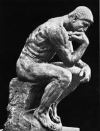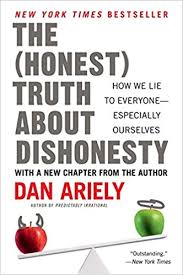
To love truth for truth’s sake is the principal part of human perfection in this world, and the seed-plot of all other virtues.
This is great and inspirational quote, but in most interpretive sieves I believe it is wrong. Hume’s assertion that “reason is and ought only to be the slave of the passions” is closer to the truth in terms of describing the typical human in terms of how they think, and what they value.
One of the insights of modern cognitive science is that the “rational” and “reflective” component of our mind tends to promote some delusions about its role in our decision-making process. Rather than being the conductor, it’s more often the rationalizer. That is, we make a decision, and then we concoct rationales after the fact. One can think of conscious rationality as a public relations outfit, as opposed to the client.

In Near Eastern antiquity the scribal caste was very much a group of literate wizards. No doubt some elements of literacy percolated to the general public, as is evident by graffito hieroglyphics by workers in ancient Egypt, but habitual engagement with the written word was the purview of a small group of professionals. These individuals dealt in abstraction in their day to day, and by the middle of the first millennium B.C. out of the culture of scribes developed the group we would term intellectuals. The philosophers, prophets, and sages of antiquity. A period when religion, magic, and science, were all one.

Across the centuries, and even millennia, the minority of intellectuals who notionally chased the truth, Plato, Sima Qian, and Ibn Khaldun, remain in our memories because their ideas were powerful, attractive, and their intellectual coherency and brilliance impressed future generations of thinkers. But we need not infer from this that in their own time they were of such inordinate fame or glory in relation to others of similar note though intellectual mediocrity. To give a concrete example, for a few shining decades phlogiston and Lysenkoism were bright and influential, even though the latter, and possibly the former, were both fraudulent enterprises.

Even aside from the puffed up historical importance given to intellectuals by the histories which they write, there is the problem that intellectuals themselves are quite taken in by motivated reasoning. Because most premodern intellectuals were much more generalist than moderns it is hard to project backward, but we know modern thinkers are strongly impacted by motivated reasoning within their fields, and ignorance outside of their fields. To give a concrete example extremely brilliant biologists know nothing of psychometrics, so they just parrot conventional wisdom with no understanding of the state of the field. Similarly, many non-geneticists believe that epigenetics has revolutionized our understanding of genetics, when many geneticists would demur. Many non-evolutionary biologists believe that Stephen Jay Gould revolutionized evolutionary biology, even when evolutionary biologists who are sympathetic to Gould would demur.
In the long-term, the truth probably has an advantage, but in the short-term showy sophistry can easily overwhelm that signal for most of the population, including intellectuals.
Finally, is the fidelity to the truth even the most important aspect of human character or nature? How about we change Locke’s assertion to “To love kindness for kindness’ sake is the principal part of human perfection in this world, and the seed-plot of all other virtues.” How many would object?

If you are in the natural sciences or other parts of the academy where rigorous analysis and empiricism are still valued in the ideal (e.g., analytic philosophy, economics, and mathematics) then you live in a world where truth is valorized and glorified incessantly. The social norms to promote truth, even if you often fail, are very powerful. The truth may be a god we honor in the breach, but we still honor that god. People who live in these intellectual subcultures are reinforced by what we read in history and our public culture that truth is first and foremost what humans value.

Of course, there is a small cult of truth which exists in the world. Overrepresented among intellectuals across the centuries they’ve reshaped humanity in their own image, falsely. Even though they miss the mark, they continuously strive for truth, and plumb abstruse depths of abstraction when others might pursue power and glory. The hard truth is that this cult needs to confront the truth that for most humans truth is not a major motivator in their a life well lived. Humans, like the beasts of the field, can flourish well enough in ignorant bliss. They always have, and currently are.
* I Glenn Greenwald seems like an asshole a lot of the time. But one thing I’ve never seen him do: clearly dodge and obfuscate about what he believes the truth is. There are things where I believe he’s dead wrong, but I suspect he’s sincerely wrong, instead of being nakedly partisan.


this is why i love watching Comedy Central’s roasts. tuns out, most people *know* what the truth is and that’s why they crack up at the jokes. they just can’t say it out loud most of the time.
“But most people can not write code” & even those who can are all too often not very reasonable.
“to confront the truth that for most humans truth is not a major motivator”
Well, I don’t know about this “cult”. Don’t know who exactly you’re referring to, but IMO intellectuals who grow up among humans know very well that mankind favours truth only in theory, not in practice. I’m kind of a truth junkie & you run into lots of problems if you are one.
When they ask in a job interview: “Why are you interested in this position/company?”, try to get the job if the true answer is: “Because I need money to live.”
In my younger years that made me master in the art of talking around the truth. Nowadays, I don’t care so much anymore. (Well, don’t need to, since I usually look for jobs where they don’t really ask these uncomfortable questions.)
you sound like you have a little of asperger though. lots of ppl in the ‘rationalist’ community are like this. my dad is kind of like this tbh. but i always knew what people were “really” asking when they were asking certain questions.
truth in interpersonal and professional contexts is…different.
If you are in the natural sciences or other parts of the academy where rigorous analysis and empiricism are still valued in the ideal (e.g., analytic philosophy, economics, and mathematics) then you live in a world where truth is valorized and glorified incessantly.
If this is your view of economics, you really need to get out more and meet some more economists.* Two conditions keep me from taking seriously the idea that truth is valorized, much less glorified incessantly in this field. One is the screwed up research incentives in the academy which underlie much of the replicability crisis (see also academic psychology). The other is the distortions supplied by the political implications of policy proposals (i.e., cui bono) which not only further contaminate academic research but also the vast majority of stuff coming out of policy institutes and other think tanks: tell me what answer you want, and I’ll work backward from there to figure out what assumptions are necessary for it to come out right, cherry picking any supporting evidence I can find.
*but only if economics plays an important role in your life: it likely does not if this is your view 😉
marcel, some of the same applies to the natural sciences. my point though is that economists have a positivistic ideal. research psychologists are the same. they might be deluded of course. but consider a field like sociology where many practitioners are honest about the fact that they’re not about discovering facts about the world, as opposed to changing the world to fit their norms….
” Hume’s assertion that “reason is and ought only to be the slave of the passions” is *closer* to the truth”
I’m not sure whether you were trying to make a joke
Doesn’t your insistence just prove the point? You’re not satisfied with the aphorism, and demand a more-accurate one. Which is exactly what Locke said: we don’t stop trying to improve our nominal ‘truths’.
Reason is doomed:
“Lorde of the Flies: Why College Students Reject Reason: Meet the poet who championed subjectivity and what is now called ‘intersectionality’.” by Jillian Kay Melchior on Dec. 8, 2017
https://www.wsj.com/articles/lorde-of-the-flies-why-college-students-reject-reason-1512775038
… Audre Lorde … has posthumously become the ultimate insider on American campuses, providing an ideological foundation for today’s social-justice warriors. * * *
… higher education is obsessed with “intersectionality.” Lorde didn’t invent the idea, but her adherents believe she embodies it. … Lorde, who was black and lesbian, claimed to write from the perspective of “those of us who have been forged in the crucibles of difference—those of us who are poor, who are lesbians, who are Black, who are older.” She described America as “a country where racism, sexism and homophobia are inseparable.” * * *
Lorde’s campus acolytes see the university as the “master’s house” and Western thought as his tools—which is to say that they espouse an ideology that rejects the idea of a classical education. … She continued: “But as we come more into touch with our own ancient, non-european consciousness of living as a situation to be experienced and interacted with, we learn more and more to cherish our feelings, and to respect those hidden sources of our power from where true knowledge and, therefore, lasting action comes. * * * The white fathers told us: I think, therefore I am. The Black mother within each of us—the poet—whispers in our dreams: I feel, therefore I can be free.”
In another essay, she asserts, “Beyond the superficial, the considered phrase, ‘It feels right to me,’ acknowledges the strength of the erotic into a true knowledge, for what that means is the first and most powerful guiding light toward any understanding.” She defines the erotic as “a resource within each of us that lies in a deeply female and spiritual plane, firmly rooted in the power of our unexpressed or unrecognized feelings.” If student activists seem irrational, they’re actually deliberately antirational, rejecting reason as “white” and “male.” * * *
Moreover, Lorde claims that “in order to be utilized, our erotic feelings must be recognized”—and, if her comments in a 1979 interview are any indication, accepted unquestioningly. Lorde recounts how her interlocutor, the white feminist poetess Adrienne Rich, had once told her during a conversation, “It’s not enough to say to me that you intuit it.” Lorde insists: “Even at the same time that I understood what you meant, I felt a total wipeout of my modus, my way of perceiving and formulating. … I’m used to associating a request for documentation as a questioning of my perceptions, an attempt to devalue what I’m in the process of discovering.” Skepticism or demands for evidence are not only a personal affront but an example of the oppressive system at work. * * *
Forgotten great man Francis Bacon who was seen as the originator of the arguments for empirical methodical (ie modern) science in the Enlightenment, made it a core argument for the new science that people are ATTRACTED to lies. Strangely his intellectual descendants don’t dwell on that bit much, which makes modern methodology discussions a bit empty because this point was originally the core argument.